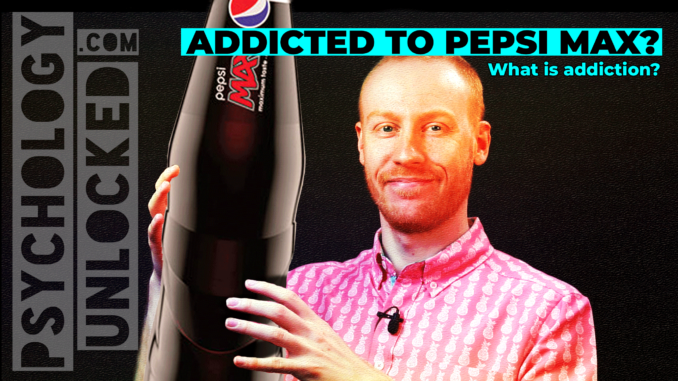
SCROLL DOWN FOR VIDEO
Everyone knows that certain substances are highly addictive – nicotine, for example – but what actually is addiction? And how does it happen?
Interestingly, it’s possible to become addicted to pretty much anything, which means that whilst in some cases we can blame the object of the addiction (due to it’s psychoactive content) other times we will have to look to ourselves.
For example, why do some people become addicted to gambling, or shopping, or working, or sex? Some people engage in these activities without becoming addicted – so what happens that makes someone addicted?
- The Dunning-Kruger Effect: Why we think we know more than we do
- The Yale Food Addiction Scale: Are you addicted to food?
- Addicted to Pepsi Max? Understand addiction in six minutes (video)
Four Stages of Addiction
Whether it’s a drug addiction or something else, someone who has become addicted to something will experience four stages.
Bingeing
The first stage is all about pleasure. You engage in a particular behaviour because you enjoy it, you get a rush from it. So your brain wants that feeling again and again. In this stage we see a transition from casual use to dependence. And so you binge on whatever it is that you’re becoming addicted to, based on a process called positive reinforcement.
Withdrawal
Positive reinforcement is soon replaced by negative reinforcement, as the addicted person engages in the addictive behaviour to avoid the uncomfortable consequences of not acting on the addictive impulses. If some tries not to engage with their addiction, they will experience withdrawal symptoms, such as headaches and irritability.
Craving
If someone who is addicted to a certain behaviour (or substance) does engage in a period of abstinence, they are likely to experience cravings for whatever they are abstaining from.
Cross-Sensitisation
Over time, cross-sensitisation is the process by which one addiciton can lead to another. Often, this is referred to as the “gateway effect”.
Is it possible to be addicted to fizzy drinks?
In the UK, the average person consumes more than two cans of fizzy drink every day. That certainly looks like potential for an addiction. And we know that the ingredients in fizzy drinks (refined sugars, caffeine) can be independently addictive, so why not when mixed together and served with a side of carbon dioxide bubbles?!
There’s actually been surprisingly little research on fizzy drink addiction, given how prevalent it seems to be in the Western World. It is right under our nose (literally!) and yet we choose not to see it.
However, there is one tool that has been developed that you can use to see whether you might be addicted to fizzy drinks, or any other type of food for that matter.
It’s called the Yale Food Addiction Scale.
Yale Food Addiction Scale
The Yale Food Addiction Scale (Gearhardt, Corbin & Brownwell, 2009) is a 35 question self-report questionnaire that aims to measure addiction to food.
The Yale Food Addiction Scale measures:
- The extent to which you overeat specific foods, despite attempts to cut back.
- The extent to which your eating behaviours interfere with your social and professional life.
- The extent to which withdrawal symptoms emerge when abstaining from specific foods.
If you want to take the test, you can download a PDF version here.
Social Side of Addiction
Addiction isn’t just a biological thing. We engage in addictive behaviours within specific environments. Sometimes, just understanding the contextual factors that influence whether you engage in a specific behaviour can help approach the addiction in a more productive way.
In the early 1970s, herion use amongst American soldiers in Vietnam had reached epidemic proportions. Politicians and the general public back in America were really worried that when the soldiers returned home after the war, they would be bringing with them a huge drug addiction problem.
But that’s not what happened (Robins, 1974). Instead, whilst 43% of US Soldiers had used heroin whilst in Vietnam, on 10% of returning soldiers continued any form of narcotics use once back in the States.
It turns out that their heroin addiction was actually a result of situational factors: they were stressed at war, and they were also bored when waiting around with nothing to do. Also, the heroin available to them in Vietnam was cheap and particularly easy to access.
When they returned to the US these contextual factors simply didn’t exist, so their behaviours changed too.
